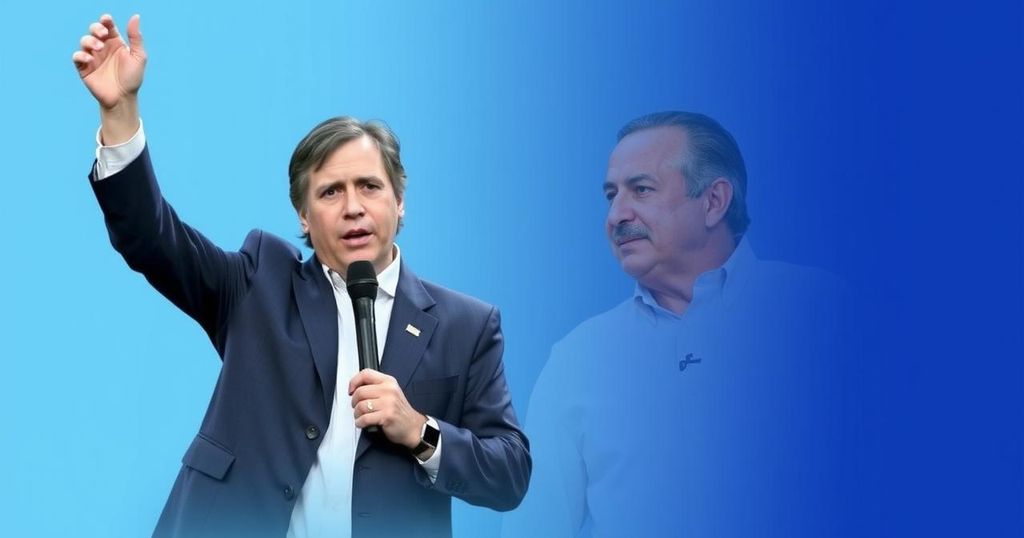Yamandú Orsi Claims Victory in Uruguay’s Presidential Runoff Against Álvaro Delgado
In Uruguay’s presidential runoff, left-wing candidate Yamandú Orsi defeated conservative Álvaro Delgado, signaling a shift in governance. Orsi, with 49.56% of the vote, called for national unity and collaboration, promising continuity with moderate reforms. The election showcases global anti-incumbent sentiment amidst economic dissatisfaction and marked nearly 90% voter turnout.
In a closely contested presidential runoff in Uruguay, Álvaro Delgado, the candidate from the ruling conservative coalition, conceded defeat to left-wing challenger Yamandú Orsi. As votes continued to be counted, Delgado expressed his heartfelt congratulations to Orsi during a speech at his headquarters in Montevideo. The election saw over 90% voter turnout as citizens expressed their desire for change, leading Orsi to pledge unity in a country marked by division despite his narrow victory of approximately 49.56% against Delgado’s 46.17%. Orsi emphasized the need for collaboration among differing political factions to build a better future for the nation.
Yamandú Orsi’s victory marks a significant shift in Uruguayan politics, following a brief period of governance by the center-right, which began with President Luis Lacalle Pou in 2019, ending a 15-year reign of the Broad Front. Orsi represents a moderate approach, maintaining key policies focused on combating childhood poverty and organized crime, which align with previous administrations. His plans include tax incentives to attract investment and reforms to social security systems, reflecting a continuity of various social and economic objectives pursued by the Broad Front in the past.
The electoral outcome signals a global trend of anti-establishment sentiment, not just in Uruguay but across several nations grappling with post-pandemic economic challenges. Yet, Orsi has reassured citizens that he does not intend radical changes, aiming for a balanced approach that seeks to unite differing views while addressing pressing economic issues, including inflation and rising crime rates.
In his acceptance speech, Orsi articulated a commitment to national unity, stressing his role as a president who would seek dialogue among all citizens to foster an equitable society. Nonetheless, the results highlight that the incumbent party faced significant backlash due to years of economic stagnation and rising dissatisfaction among voters, propelling Orsi to victory as he prepares to assume the presidency and guide Uruguay toward a renewed path based on collaboration and social equity.
The recent presidential runoff in Uruguay signifies a critical juncture in the nation’s political landscape, reflecting a broader trend of change in various democracies grappling with economic instability and popular discontent. The election not only ended the center-right coalition’s governance but also reinstated a left-oriented leadership represented by Yamandú Orsi, a candidate from the Broad Front. This electoral shift can be seen in the context of a global trend where voters increasingly favor anti-establishment candidates in response to prevailing social and economic issues. Adapting to these challenges, Uruguayan citizens turned out overwhelmingly at the polls in support of new leadership that promises both continuity and reform in social and economic policies.
The presidential runoff in Uruguay has ended with the victory of Yamandú Orsi, presenting him as the successor to Álvaro Delgado. His election is not only a response to existing national frustrations over economic conditions and governance but also denotes a movement towards a moderate leftist approach. Orsi aims to unite the country and address its challenges collaboratively, continuing certain socio-economic initiatives from the previous administration while promising to innovate in policy areas critical to the community’s progress. This shift reflects a re-evaluation of the political landscape in Uruguay as voters seek representatives who pledge to engage all factions of society in building a better future.
Original Source: www.thoroldtoday.ca




Post Comment